Weaver asked Lucas what he and Bob would be doing, and Lucas said, “We’ve got another guy to talk to in Miami. Don’t know what will come out of it, but he’s bigger than the dealers we’ve been hitting so far. We’ve heard that he might actually be able to tell us something and that he could really use our . . . affection. He has a couple years of probation hanging over his head.”
“If anyone busts him, he’s going back to Atlanta. Not exactly a garden spot,” Bob added.
With Weaver’s blessing, they headed south, again on I-95, the only way they knew. On the way, Bob took a call from Rae Givens, his partner, who was still with her cancer-stricken mother in Houston. They talked for a few minutes about her mother’s condition and about the Miami investigation.
“We’re kicking ass,” Bob told her. “We got the only break the feds have gotten so far. We fed it to them. We could get another one in the next couple of hours.”
He listened for a moment, glanced at Lucas and then said, “Don’t worry about me. I’m taking care . . . I won’t. It’s just fine.”
When he rang off, Lucas said, “She’s still pissed at me.”
“Naw. She’s . . . worried about you.”
“Sounded more like she was worried about you and what I might get you into.”
Bob wiggled in his seat, then said, “Well . . . you know, what we do is a lot cleaner than what you do. The people we chase have already been in court, one way or another. They’re guilty, or they’re on the run because they know they’re screwed and they’re headed for prison. We spot them, plan everything out, and then grab them. With you . . .”
“Yeah?”
Bob was looking out the window at all the passing concrete: “With you . . . it’s always kinda fuzzy, more free-form. Sometimes we’re not sure who did what, or why. Sometimes things get done for political reasons. Not court reasons.”
“You didn’t have to come along,” Lucas said.
“No, no, I find it interesting. Rae does, too. Every once in a while, though, you go full Schwarzenegger. We’ve only been hanging out for what, three years? I’ve been shot and you’ve been shot and your FBI girlfriend Jane Chase got shot . . .”
Lucas half-smiled: “Jane has signaled that there might be a change in our relationship.”
“Because she got shot?”
“No, because I shot the 1919 guy. She wanted a show trial with all the fixin’s.”
“I’d prefer that myself, to be honest,” Bob said. “But, if that’s not the way it is, it’s still intense. I like intense.”
They followed the concrete channel to 103rd Street in Miami, turned west to 27th Avenue, then back north to 131st Street and then east, and Lucas said, “What are we doing? We’re driving in circles.”
“The streets get all tangled up,” Bob said, looking at the map on his phone. “This was the quickest way. Turn here.”
They turned south again and after a few hundred yards, again back west on Country Club Lane. The houses were small, flat, concrete block boxes generally separated from the street with chain-link or steel-bar fences. The narrow, blacktopped streets were potholed and cracked, all set in a flat landscape of palms and slick-leaved tropical-looking trees, along with a few cedars and rubber trees. Bob said, “Banana tree! Bananas grow upside down. See?”
“I knew that,” Lucas said.
“Bullshit you knew that . . . Magnus is around the corner. There’s a canal . . . It’s the green one.”
Elliot’s house looked across the narrow street and a canal toward the back of an apartment complex. They cruised the house, which was a sour chemical green with a tar roof, the yard surrounded by a chest-high steel-bar fence; each of the bars had a sharp arrow point at the top. The yard, like the neighboring yards, had ankle-deep grass, unmown for weeks. The driveway was gated, and a single pedestrian gate would open toward the street, if it hadn’t been chained shut.
“A little fort,” Lucas said, as they drove past. “You’re wearing Nikes, right?”
“Yeah. I can’t vault that fence, if that’s what you’re thinking. I’d wind up getting one of those arrowheads right in the nuts.”
“That’s not what I’m thinking. What I’m thinking is that there’s no curb, so I drive right up to the fence, nose in, we climb on the hood of the truck and jump down. Don’t want to dent the hood, though, so Nikes are good.”
“Let me loosen up my gun and put on a marshal vest,” Bob said. “If he’s a big-time dealer he might not be happy about unexpected drop-ins.”
They stopped at the end of the street and Bob stepped around behind the truck, popped the back lid, dug in his gear bag and got out two blue bulletproof vests that said police in tall white letters and under that, in smaller letters, u.s. marshal. Lucas pulled off his sport coat, took his ID out of the jacket pocket and put it in the hip pocket of his jeans.
They got the vests on, turned the truck, rolled back up the street and Lucas swerved out toward the canal and then back toward Elliot’s gate. He stopped with the grille two inches from the gate, the back of the truck blocking six feet of the street. He and Bob popped their doors, stood on the front bumper, climbed on the hood one at a time, and dropped down over the fence.
Five seconds later, they were on either side of the front door, a yellow-painted slab of wood that did not look kickable. Lucas pushed the doorbell and they heard the sound of the bell through sets of louvered windows to the sides of the door. Bob knocked—pounded—twice and then moved closer to the windows and shouted, “U.S. Marshals!”
A man’s voice: “Hold on. I’m comin’.”
Lucas and Bob pulled their pistols and a second later the door cracked open on a chain that looked like it should have been used to pull logs out of the forest. Elliot’s face appeared above the chain. He looked at the vests and asked, “ID?”
Lucas pulled out his ID and flipped it open. Elliot squinted at it, then at Lucas’s face, and then at Bob’s, and said, “Gotta close the door to get the chain off.”
He stepped out of sight and pushed the door most of the way closed. He did something inside, Lucas thought, then the chain rattled off its hooks and Elliot opened the door. He was a large man, brawny, with both muscle and a heavy layer of fat. Blond, blue eyes, broad nose, heavy lips. He was wearing a pink golf shirt, khaki shorts, and sandals.
“What d’you want?”
“This is more of an interview than anything,” Lucas said. “We need to talk.”
Elliot took a step, as if to come out, but Bob put up a finger on his non-gun hand and said, “Inside.”
Elliot backed away and they followed him inside. The house was neatly kept, sparely furnished with a motley collection of chairs and tables. A two-drawer couch table sat to the right of the door, and when they were fully inside, Lucas put his gun away, reached out, and pulled open the closest drawer on the table. Elliot said, “Hey!” but Lucas pulled anyway, and sitting inside, on a copy of Guns & Ammo magazine, was a blue-black .45 auto.
Bob glanced at it and said, “Oh. My. God. A felon with a gun.”
“This is a bad neighborhood,” Elliot said.
“And you’re one of the baddest neighbors in it,” Bob said.
Elliot: “Not by a long way, buddy.”
Lucas could see a kitchen at the back of the house with a breakfast bar and three stools. “Talk in the kitchen,” he said. He lifted the .45 out of drawer, popped the magazine, jacked the slide and a round flipped out, onto the ragged blue carpet. Lucas bent over, picked up the .45 round, shucked all the others out of the magazine and dropped them in the drawer and pushed it shut.
Elliot, backing toward the kitchen, watched him working with the gun. Bob pointed Elliot at one stool, and sat beside him, with Lucas sitting across the breakfast bar, the .45 still in his hand. He took a few seconds to disassemble the gun, then reached back and placed the pieces on the stove.
Читать дальше
![Джон Сэндфорд Ocean Prey [calibre] обложка книги](/books/384313/dzhon-sendford-ocean-prey-calibre-cover.webp)
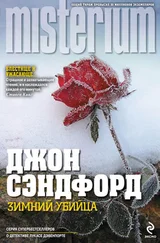

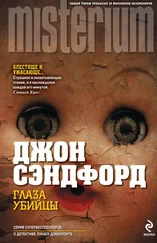
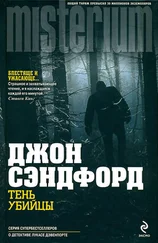
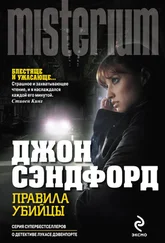
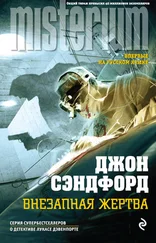
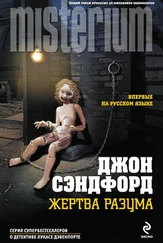
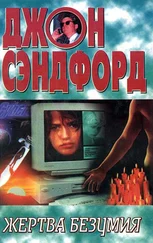

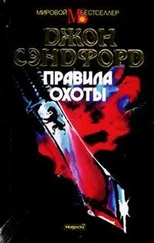
![Джон Ирвинг - Viename asmenyje [calibre]](/books/384315/dzhon-irving-viename-asmenyje-calibre-thumb.webp)
![Джон Ирвинг - Vandens metodas [calibre]](/books/384316/dzhon-irving-vandens-metodas-calibre-thumb.webp)